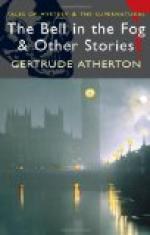II
The Striding Place
Weigall, continental and detached, tired early of grouse-shooting. To stand propped against a sod fence while his host’s workmen routed up the birds with long poles and drove them towards the waiting guns, made him feel himself a parody on the ancestors who had roamed the moors and forests of this West Riding of Yorkshire in hot pursuit of game worth the killing. But when in England in August he always accepted whatever proffered for the season, and invited his host to shoot pheasants on his estates in the South. The amusements of life, he argued, should be accepted with the same philosophy as its ills.
It had been a bad day. A heavy rain had made the moor so spongy that it fairly sprang beneath the feet. Whether or not the grouse had haunts of their own, wherein they were immune from rheumatism, the bag had been small. The women, too, were an unusually dull lot, with the exception of a new-minded debutante who bothered Weigall at dinner by demanding the verbal restoration of the vague paintings on the vaulted roof above them.
But it was no one of these things that sat on Weigall’s mind as, when the other men went up to bed, he let himself out of the castle and sauntered down to the river. His intimate friend, the companion of his boyhood, the chum of his college days, his fellow-traveller in many lands, the man for whom he possessed stronger affection than for all men, had mysteriously disappeared two days ago, and his track might have sprung to the upper air for all trace he had left behind him. He had been a guest on the adjoining estate during the past week, shooting with the fervor of the true sportsman, making love in the intervals to Adeline Cavan, and apparently in the best of spirits. As far as was known there was nothing to lower his mental mercury, for his rent-roll was a large one, Miss Cavan blushed whenever he looked at her, and, being one of the best shots in England, he was never happier than in August. The suicide theory was preposterous, all agreed, and there was as little reason to believe him murdered. Nevertheless, he had walked out of March Abbey two nights ago without hat or overcoat, and had not been seen since.
The country was being patrolled night and day. A hundred keepers and workmen were beating the woods and poking the bogs on the moors, but as yet not so much as a handkerchief had been found.
Weigall did not believe for a moment that Wyatt Gifford was dead, and although it was impossible not to be affected by the general uneasiness, he was disposed to be more angry than frightened. At Cambridge Gifford had been an incorrigible practical joker, and by no means had outgrown the habit; it would be like him to cut across the country in his evening clothes, board a cattle-train, and amuse himself touching up the picture of the sensation in West Riding.




